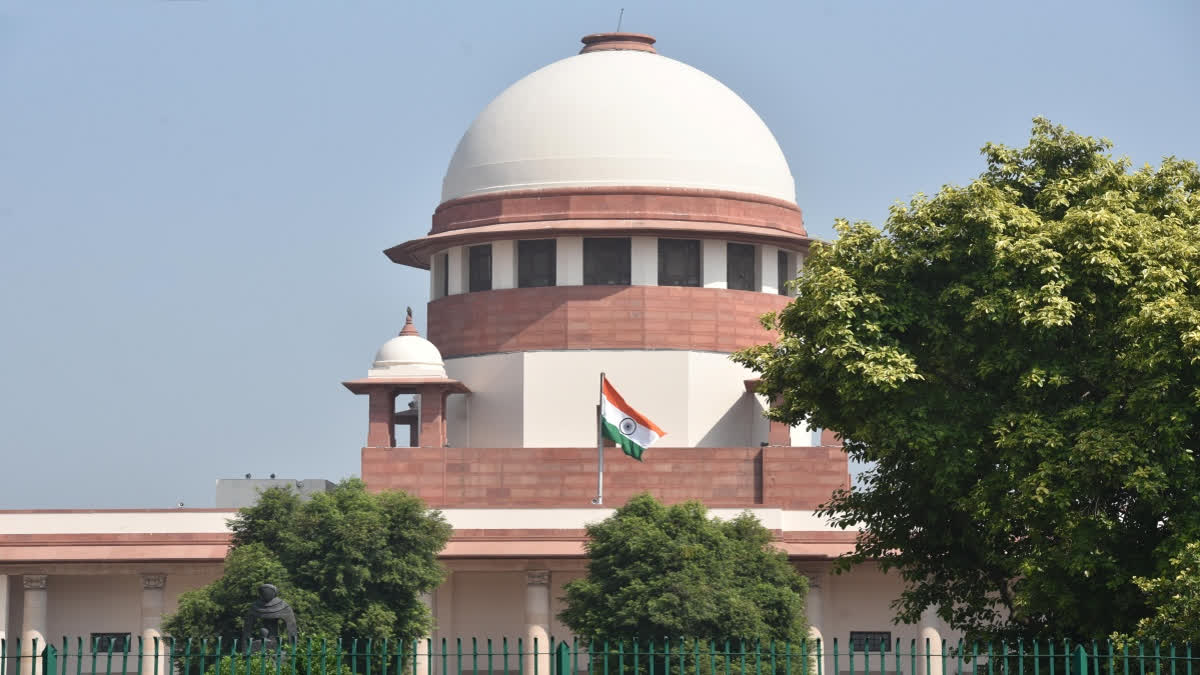New Delhi: The Supreme Court on Friday stayed the instructions issued by NG Acharya & DK Marathe College in Mumbai, which imposed a ban on wearing hijab, niqab, burqa, caps and similar attire on the college premises.
The bench told the college that it is unfortunate that it has come up with these kinds of instructions after so many years of independence and observed, "probably within sometime they realise that it is not required...".
A bench led by Justice Sanjiv Khanna told counsel, appearing for the college, that it should not have imposed such a rule and religion is revealed by name.
"You do not want students' religion to be revealed. Their names reveal their religion…will you ask them to be given numbers…," said the bench, also comprising Justice Sanjay Kumar, adding that a statutory issue is already pending before the court.
The apex court is yet to decide the legality of such directions issued by educational institutions. In October 2022, a two-judge bench of the apex court delivered opposing verdicts in the hijab controversy in Karnataka. The then BJP-led state government had imposed a ban on wearing the Islamic head covering in schools there.
During the hearing, the top court was informed that there are 441 girls in the college from the Muslim community and barriers are created when a girl is wearing a niqab. Senior advocate Madhavi Divan, representing the college, said the college is already providing lockers and it is also providing changing rooms.
"They must study together…you may be right because the background they belong to, the family members may say wear and go and do not take it out…," said Justice Khanna.
The counsel said they emphasise on niqab and not just hijab, and they have not been wearing it always. The bench said should it not be left on the girl to decide what she wants to wear? Divan said tomorrow people will come in saffron shawls and the college does not want that to happen, and "we are not a political playground or a religious playground".
"Suddenly you woke up to the fact that there are different religions in the country?," asked the bench. The bench was informed that some women have joined other colleges, to which the bench replied, "that it sad".
"It is unfortunate you come up with these kinds of instructions after so many years of independence…," said the bench, staying the instructions issued by the college.
Divan pressed that there should not be a stay and the court should hear her on the issue. "With face cover, how do I allow….niqab, these are barriers to interaction," said Divan, adding that 441 Muslim girls are attending the college and there is no problem and it is these three girls in this controversy.
"But why issue a circular of this nature, let us assume three of them were wanting to be separate or distinct. Let them be. Probably within sometime they realize that it is not required…," said Justice Khanna.
Divan said, "if a girl wears a niqab or a prominent religious cover…". At this juncture, the bench said, "will you say that somebody wearing a tilak will not be allowed?....no bindi?”. Divan replied in the affirmative. The bench said they should not be asked to leave the college, Divan clarified that her client has not asked them to leave the college.
The bench issued notice on the petition returnable in the week commencing from November 18. In the order, the bench clarified that the stay order should not be misused by anybody and allowed the college authorities to seek the modification of the order if there is any such misuse. Senior advocate Colin Gonsalves represented the petitioners. "Certainly, no burqa can be permitted, cannot sit in class like that…", said the bench, to which Divan questioned why a face cover should be permitted.
The plea filed by girl students’ contended that the dress code was arbitrary and discriminatory and the college was wrong in its order in trying to impose a dress code. The plea said that the code infringes upon their right to choose their attire, their right to privacy, and freedom of expression under Article 19(1) (a) and their right to freedom of religion under Article 25 of the Constitution.
The authorities of the N G Acharya & D K Marathe College, in Mumbai prescribed a dress code prohibiting their students from wearing hijab, niqab, burkha, stole, cap, etc, on campus. The dress code was challenged by nine female students before the High Court. The Bombay High Court verdict had upheld a Mumbai college's decision to ban hijabs, burqas, and niqabs on the campus. The college students challenged the High Court's judgment before the top court.



